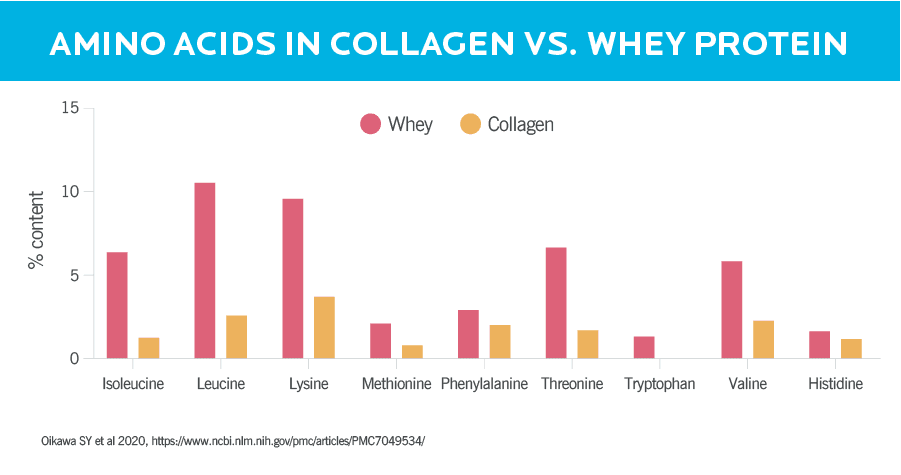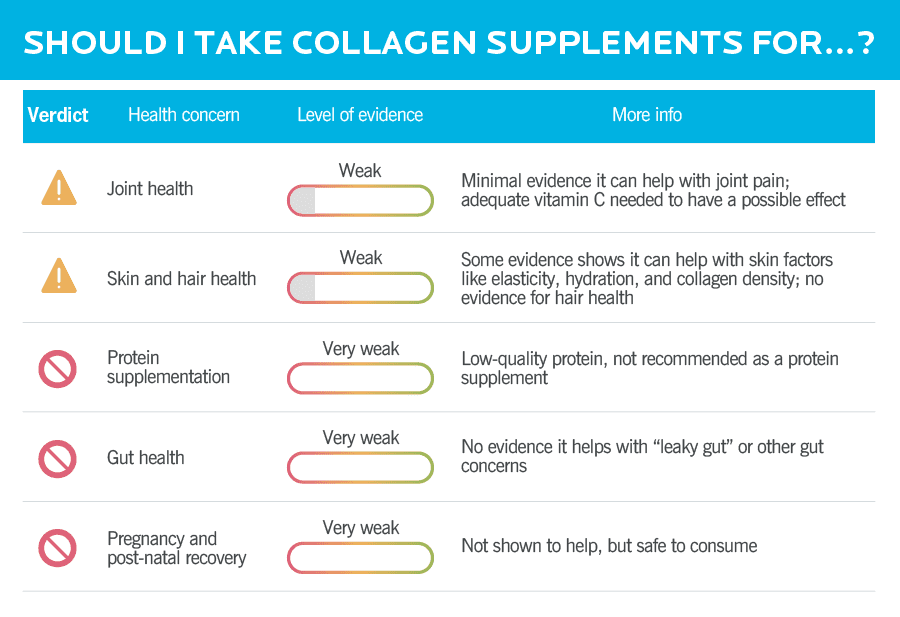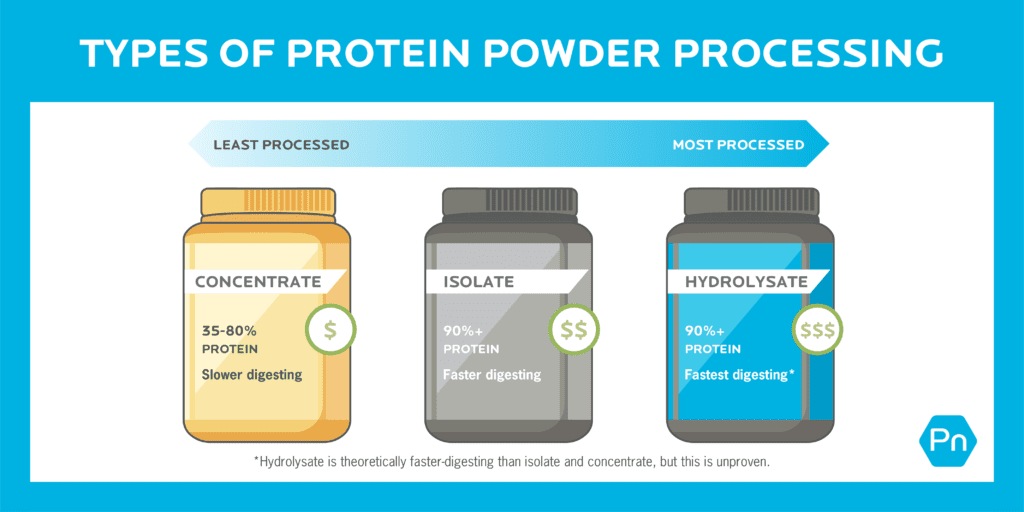Reviewed by Helen Kollias, PhD
What is collagen? | Collagen vs. gelatin | Joint pain | Skin health | Hair growth | Protein content | Gut health | Pregnancy and postpartum | Should you take collagen?
Every morning, thousands of people dump some white powder into their coffee or tea.
That white powder is collagen, and it’s (still) having a moment.
Many people (maybe yourself or your clients included) use it because of the claims that it can improve skin, hair, joint, bone, and gut health. And also that it’s the “cleanest” and “most absorbable” protein source. (At least, that’s what the collagen supplement companies say.)
But do collagen supplements actually work?
In this article, we’ll find out.
++++
What is collagen?
Collagen is an important structural protein in the body found in our skin, bones, muscles, tendons, and ligaments. As we age, we produce less collagen. (Hi, wrinkles and creaky joints.)
While there are at least 16 different types of collagen, types I, II, and III make up 80 to 90 percent of the collagen in our bodies.1
Where does collagen come from?
Collagen supplements are usually derived from bovine hide (bovine collagen) or fish (marine collagen). These generally come in a flavorless powder that dissolves in liquid. They can also come in pill and liquid form.
Collagen can be found in foods too. Bone broth, certain cuts of meat and poultry, and fish (especially the skin) are all good sources.
Some brands promote vegan or vegetarian collagen options, but these products don’t contain collagen. Instead, they contain nutrients that may promote collagen production, such as vitamin C.
Hydrolyzed collagen, collagen peptides, and gelatin: What’s the difference?!
Well, the first comparison is easy: Hydrolyzed collagen and collagen peptides are actually the same thing.
“Hydrolyzed” just refers to the processing—using heat, enzymes, or acid to break apart protein chains into shorter chains, or peptides.
The claim is that hydrolyzed protein, or shorter peptides, are easier to absorb than longer-chain proteins. However, research doesn’t support that theory, particularly in the case of collagen. 2
Gelatin is the cooked form of collagen. It’s liquid at high temperatures and gels at low temperatures. (Think: Jell-O, which contains gelatin.)
Nutritionally, collagen and gelatin are essentially the same. The main difference? Gelatin is a whole lot cheaper. (More on that later.) And in fact, much of the research used to support collagen’s potential benefits—such as collagen regeneration in muscles and tendons3,4—is actually research on gelatin.
The real benefits of collagen supplements
Here’s a rundown of what we know about collagen supplements.
Collagen for joint pain
Of all the buzzed-about benefits of taking collagen, this is one of the most well-studied. (Hey, we want to play tennis without knee pain!)
Some research suggests that type II collagen could potentially support joint health when taken with vitamin C.3 The vitamin C part is important, since the body needs vitamin C in order to make collagen.
That said, reviews and meta-analyses have failed to find collagen supplementation benefits people with joint conditions like osteoarthritis and tendinopathy, the breakdown of the tendons.5,6
One common argument is that since collagen is generally made from bone and cartilage, it should contain everything we need to repair these parts of our body. However, most of the amino acids in collagen are ones we can make on our own (like glycine, proline, and alanine) or ones that we can’t use very well in our body (like hydroxyproline).7
Bottom line: Some research shows collagen may help with joint concerns when taken with vitamin C, but the evidence overall is weak.
Your body doesn’t care about advertising.
Many collagen supplements are marketed for specific concerns, like wrinkles or joint pain.
And it would make sense that if you’re lacking collagen in your skin or joints, you could just supplement with collagen to take care of it, right?
However, eating more collagen doesn’t necessarily equal more collagen wherever you want it.
Instead, your body determines where the amino acids from collagen (or any protein source) you ingest will go.
Meaning, amino acids are more likely to be used to build enzymes, hormones, and neurotransmitters—or build/maintain lean tissue—than they are to smooth out your crow’s feet.
So, just because that collagen brand says it’s for skin or sore knees doesn’t mean your body will use it for that purpose.
Collagen for skin health
Collagen is what makes our skin plump and elastic. That’s why collagen and collagen-enhancing ingredients are common in skincare products. Similarly, collagen supplements promise to increase skin elasticity and combat wrinkles “from the inside out.”
While collagen has the potential to improve skin, the evidence isn’t definitive.
Taking collagen may stimulate hyaluronic acid production in the skin, which keeps skin moisturized and plump.8,9 And one review did find that collagen supplements increased skin elasticity, hydration, and dermal collagen density.10
But collagen supplements do nothing to reduce collagenase, an enzyme we all produce that degrades our collagen stores over time. So, positive effects from taking collagen supplements can only be maintained if you continue taking those supplements indefinitely.
Further, many of the studies on collagen for skin health (as well as other areas of health) have been funded and run by the companies who’ve created the products. Industry-funded studies aren’t always biased, but it’s a risk.
Last thing: There are more reliable ways to enhance collagen production and maintain collagen stores in your skin:
- Using skincare products with vitamin C 11, retinol/retinoid acid12,13, glycolic acid, and/or hyaluronic acid14
- Wearing sunscreen15
Bottom line: More research is needed, but collagen supplements may help (minimally) with skin health.
Collagen for hair growth
Collagen contains some of the amino acids needed to produce keratin, a protein found in hair.
But currently, there’s no evidence that taking collagen will make your hair grow faster, thicker, or stimulate hair regrowth.
Bottom line: Don’t rely on collagen to make your hair grow.
Collagen as a protein supplement
Despite the claims of being “superior” and “highly absorbable,” collagen is not an ideal protein source. In fact, until pretty recently, it was considered a “junk” protein that wasn’t used for much of anything.
There are a couple of reasons why.
Reason #1: Collagen is an incomplete protein.
That means it doesn’t contain all nine essential amino acids (EAAs).7,16 (Collagen is missing tryptophan, as shown in the graphic below.) Your body can’t make EAAs, so it must get them from food.
Incomplete proteins have a place in a healthy diet, but to get the most bang for your buck, collagen is simply not worth the cash due to its status as a low-quality protein.

Reason #2: Collagen is low in other EAAs.
Because of this, even when tryptophan is added, collagen still scores low in terms of quality compared to other proteins like whey, casein, or soy.
(To understand protein quality and why it matters, read our guide to choosing the best protein powder for you.)
Also, if you want to enhance workout recovery, muscle gain, or muscle retention, collagen isn’t your best bet.17 Muscle protein synthesis requires the amino acid leucine, and collagen has very little of it.18 (Learn more about leucine in our article on BCAAs.)
Bottom line: Collagen is not the best quality protein supplement.
Collagen for gut health
Collagen is rich in amino acids glycine and proline, and has some glutamine. Some say these amino acids have the potential to help heal the gut lining and promote digestive health, particularly in people with “leaky gut.”
However, while intestinal permeability is associated with certain digestive diseases, it doesn’t have direct symptoms.
While there’s some research showing glutamine and glycine may be helpful for intestinal health, robust evidence is lacking.19
(To learn more about how to improve gut health, check out this comprehensive resource on probiotics.)
Bottom line: It’s unlikely that taking collagen improves gut health.
Collagen in pregnancy and postnatal recovery
Collagen is high in glycine, which is considered a non-essential amino acid (your body can make it).
But new research shows it’s conditionally essential—meaning you might need to get some from food—in the later stages of pregnancy (~35+ weeks). This is due to increased nutritional demand to form a baby’s collagen stores.20
This has led some prenatal nutrition experts to suggest supplementing with collagen during pregnancy, especially in the later stages.
While this isn’t a bad idea, it’s not necessary if you’re getting adequate complete proteins through your diet. (Protein needs in late pregnancy are 1.52 grams/kg of body weight per day.21) Whole-food proteins like meat, fish, protein powders, and dairy contain more than enough glycine to meet your needs.
(The only exception is vegans, who may not get enough glycine in late pregnancy from whole foods. But collagen isn’t a vegan option anyway.)
On a related note, some women swear supplementing with collagen helped them heal and recover post-pregnancy. There’s no evidence showing supplementing with collagen is better than eating a diet with enough protein. However, collagen is safe for new moms, so if this is an approach that interests you, have at it!
Bottom line: Collagen may be helpful for women who are pregnant or postpartum, but it’s no better than eating a healthy diet with enough protein.
Should you take collagen supplements?
Ultimately, that’s up to you.
Here’s a quick recap of the potential benefits and their quality of evidence:

Here are some other factors to consider when making your decision.
Supplement quality varies.
There are some concerns about heavy metal contamination with collagen. So, look for third-party tested options to ensure purity and quality. (Read the “purity and quality” section of our article on protein powders for specifics.)
Gelatin is a safe, cheap alternative.
Not only is gelatin much cheaper, it may be safer. That’s because, in most countries, regulations for food production are much stricter than regulations for supplement production.
And remember, key research used to support collagen supplementation was actually done with gelatin.
Get enough dietary protein and vitamin C.
It’s probably not worth spending money on collagen if you’re not already doing these two things.
Aim for a minimum protein intake of about 0.8 grams of protein per kilogram of body weight per day (0.36 grams per pound). That said, many people can benefit from more:
- Adults over 65: 1.2 to 2.0 grams of protein per kilogram of bodyweight per day (0.55 to 0.91 grams per pound)
- Athletes and active people: 1.2 to 2.2 grams of protein per kilogram of bodyweight per day (0.55 to 1.0 grams per pound)
- People who want to change their weight or body composition: 1.6 to 3.3 grams per kilogram of bodyweight per day (0.75 to 1.5 grams per pound)
In terms of vitamin C, adult females need 75 mg a day, while adult males need 90 mg. It’s safe to supplement up to 2,000 mg a day.22
FYI, research on collagen and vitamin C used 48 mg of supplemental vitamin C, so you don’t need to megadose to stimulate collagen. Also, solo vitamin C has been shown to increase collagen synthesis.23 Neat!
More collagen isn’t necessarily better.
Exercise, sleep, water—it’s possible to get too much of anything.
Considering that collagen’s benefits are minimal, taking extra doesn’t make sense. (If you choose to take collagen or gelatin, 10-15 grams per day is likely sufficient, which is the quantity studied in most joint and tendon research.)
Because collagen is a low-quality protein, it shouldn’t replace other forms of protein in your diet. That’s when we could cross over from “can’t hurt, might help” territory into the “possibly harmful” zone.
Currently, we don’t have research comparing collagen to higher quality sources of protein, such as meat and whey, which would help us find out if collagen really is “special.”
References
Click here to view the information sources referenced in this article.
If you’re a coach, or you want to be…
You can help people build sustainable nutrition and lifestyle habits that will significantly improve their physical and mental health—while you make a great living doing what you love. We'll show you how.
If you’d like to learn more, consider the PN Level 1 Nutrition Coaching Certification. (You can enroll now at a big discount.)




Share